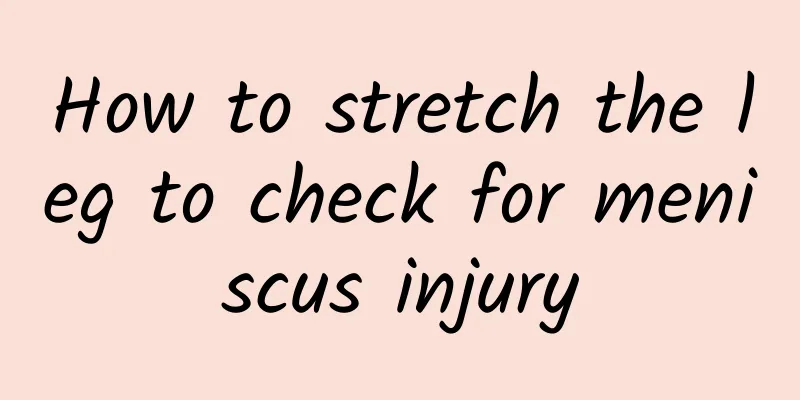How to stretch the leg to check for meniscus injury

|
Meniscus injury is a relatively common condition, mainly occurring in people who often play basketball or do strenuous exercise. When it occurs, a relevant examination needs to be carried out as soon as possible so as to determine the severity of the patient's condition. The most direct examination method is to stretch the legs, so that a preliminary judgment can be made, which will be of great help for subsequent surgery and conservative treatment. 1. Tenderness The location of tenderness is generally the location of the lesion, which is important for the diagnosis of meniscus injury and the determination of its injury site. During the examination, place the knee in a semi-flexed position, and press point by point from front to back along the upper edge of the tibial condyle (i.e. the edge of the meniscus) in the medial and lateral gaps of the knee joint with the thumb. There will be fixed tenderness at the site of meniscus injury. If the knee is passively flexed or the calf is internally and externally rotated while pressing, the pain will be more obvious, and sometimes the abnormally active meniscus can be touched. 2. McMurray test (rotational extrusion test) The patient lies on his back, and the examiner holds the calf ankle with one hand and the knee with the other hand to flex the hip and knee as much as possible, and then abducts and externally rotates the calf, or adducts and internally rotates, or adducts and externally rotates, and gradually straightens it. The test is positive if pain or sound occurs, and the location of the injury is determined based on the location of the pain and sound. 3. Strong hyperextension or hyperflexion test If the knee joint is passively hyperextended or hyperflexed, such as if the anterior meniscus is injured, hyperextension may cause pain; such as if the posterior meniscus is injured, hyperflexion may cause pain. 4. Lateral pressure test With the knee in extended position, forcefully passively adduct or abduct the knee. If there is a meniscus injury, pain will be caused by compression in the joint space on the affected side. 5. Single-leg squat test Use one leg to hold weight and gradually squat from a standing position, and then stand up from a squatting position. The healthy side is normal, but when the affected side squats or stands up to a certain position, the damaged meniscus is squeezed, which may cause pain in the joint space and even make it impossible to squat or stand up. 6. Gravity test The patient lies on his side and lifts his lower limbs to perform active flexion and extension of the knee joint. When the joint space on the affected side is downward, pain is caused by compression of the damaged meniscus. On the contrary, when the joint space on the affected side is upward, there is no pain. |
<<: What does meniscus degeneration mean?
>>: What are the plasters for treating meniscus injuries?
Recommend
Cerebral arteriosclerosis, prevention is effective
Cerebral arteriosclerosis is a local manifestatio...
Why does a root canal hurt?
Everyone has cavities on their teeth to some exte...
How to treat ear fungal infection?
The ears may also get fungal infections, which I ...
Can I eat food while having a blood test?
Generally speaking, unless there are special requ...
Can I walk if the fracture line is blurred?
The blurred fracture line does not mean that the ...
What season is suitable for moxibustion?
Man and nature are actually a unified and coordin...
How to relieve neck pain caused by internal heat
Getting heat in the neck is a common symptom in o...
Platelet 39
Everyone should be clear that platelets play an i...
Which is better, moxibustion or cupping?
Whether it is moxibustion or cupping, they are bo...
Nursing measures for myocardial infarction
Myocardial infarction is a disease that endangers...
What are the benefits of eating walnuts for hair
Walnuts have a certain effect in promoting the tr...
What should I do if I have a nosebleed due to getting angry?
Nosebleed is not actually a particularly serious ...
What is the best way to remove acne?
Everyone loves beauty, and everyone wants to have...
Symptoms of measles in children
Urticaria is a common skin disease. There are man...
Arisaema
Arisaema is a very common herb with a long histor...









